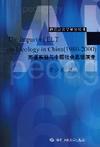西语东渐与中国社会思想演变
2006-12
华中师范大学出版社
章少泉
222
220000
无
This study takes a political approach to English Language Teaching (ELT) in China. It was prompted by two parallel developments in China during the past twenty years or so:the expansion of ELT and changes in ideology. The study looks intothe hitherto scarcely explored political aspects of ELT and finds that ELT has significant impact on both the official ideology andthe people's belief system. It fills in a gap in the research of contemporary Chinese politics by revealing the political consequences and implications of ELT. Findings of the study onthe one hand de-mythologize the political innocuousness of ELT,and on the other hand throw light on the more general questions regarding the causes and process of ideological change.
ELT in China and Its Lily Pond Effect:An IntroductionPrefaceAcknowledgementsAbbreviationsChapter One Introduction:the Politics of English Language Teaching in China Research Problem Research Gap Rationale and Significance Methodology Alternative Approaches Organization of the BookChapter Two Literature Review:The Foreign Language Dilemma Introduction International Perspective Chinese Historical Perspective Chinese Pidgin English The Ti-Yong Formula The Chinglish Phenomenon ConclusionChapter Three Ideology and Ideological Changes Pure Ideology and Practical Ideology The Dialectic of Change Modifications:Alternative Approaches The Interaction between Formal Ideology and “Lived Ideology” The Foreign Language Dilemma in the Reform EraChapter Four The Ideological Functions of English-Language Textbooks Introduction Frame of Reference:Textbooks as Ideological Discourse Sources of Data Methodology Findings and Analyses ConclusionChapter Five The Shift of the Chinese Marxist Discourse of English Literature Introduction Ideology, Policy, and Policy Outcome History and the Persistent Presence of the Marxist Ideology The Case of D.H. Lawrence Conclusion:Ideological Change and the Role of ELTChapter Six The Trojan Horse of ELT Introduction The Case of the Voice of America The Case of George Orwell The Lily pond Effect The Mechanisms of the Trojan Horse ThePositivistic Discourse of ELT The Instrumental Approach to Foreign Language Teaching Marketization Conclusion:the Conflict-Without-Confrontation Model Chapter Seven Conclusion:the Impact of ELT on Ideology A Summary of the Findings Momentums for ELT in the Future Further ELT Impact on IdeologyAppendixBibliography
So on the one hand there is the expansion of ELT and on theother hand there is change in ideology, both of which appear veryimpressive. It is the need to interpret, to define the connectionsbetween these two developmentsthat had prompted this study. Asa Starting point, the present author makes the hypothesis thatthere is a cause-effect relationship, between ELT and ideologicalchange, with the former being the cause and the latter being theeffect. Put in the form of questions, the hypothesis involves thefollowing: What is the relationship between these two paralleldevelopments? Is there a caus.e-effect relationship between them? Ifthere is one, which development is the cause and which is theeffect? In what way and to what extent does ELT have an impacton ideology? And is the ELT case typical of ideological changes inChina in general? While a more common approach may regard political andideological changes as crucial for the expansion of ELT, thus beingthe cause for the latter, this study approaches the issue the otherway round. As shown above, it poses the question whether it isalso possible that ELT is the cause in the relationship, namely thespread of ELT has been an important factor contributing toideological changes in China. This hypothesis does not reject theview that political and ideological developments in China haveshaped ELT as it is, rather, it suggests a due recognition of thecomplexity and interaction involved in such a relationship.Therefore the study sets out to find theories and evidence thatwould support the above hypothesis.

无
引证丰富,观点合理,通俗易懂。